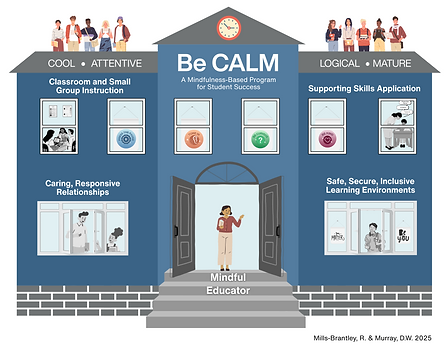RESEARCH BASED
Extensive study and review of existing self-regulation interventions and consultation with national experts.
DEVELOPED WITH USERS IN MIND
Substantial input from students, teachers, school mental health staff, and administrators to design content and methods.
FOCUS ON EDUCATORS AND STUDENTS
Promoting wellbeing in educators and staff, building capacity for program sustainability.
IMPLEMENTATION SUPPORT
Ongoing support from program developers within a professional learning community.
About the Be CALM Program
Be CALM teaches educators and students skills and strategies for lifelong health. It is a Tier 1 mindfulness-based program for 6th - 9th graders with two levels (6th/7th and 8th/9th) of developmentally-appropriate curriculum that consist of 16 (45-minute) weekly lessons each. The program builds educators' capacity for mindful teaching and compassionate engagement with students to support them in learning and applying skills in the classroom and beyond.
Watch this 5-minute video to learn more about Be CALM.
"If something doesn't go my way or the outcome isn't what I want...if it's not something super important then okay, it's not the end of the world, it's going to be fine...I try to just take a few deep breaths and just move on from it."
- 9th Grade Be CALM Student Participant
The Be CALM Approach
The Be CALM team identified two significant opportunity gaps in reviewing the literature on self-regulation interventions for early adolescents: Gap 1 - involving adults, like educators, in supporting adolescents' self-regulation skills development; and Gap 2 - greater emphasis on supporting adolescents' emotion regulation as a significant component of self-regulation. The Be CALM Program targets the first opportunity gap with the guidance of our team's Applied Contextual Model for Promoting Self-Regulation, which emphasizes the importance of interactions with caring adults for promoting youth’s developmental skills and capacities, a process we describe as co-regulation. We followed the evidence to identify an intervention that targets the second opportunity gap. Research shows that focusing on emotion regulation has the strongest positive effects on adolescent emotional wellbeing, and the evidence points to mindfulness as a promising practice for strengthening emotion regulation.

Mindfulness is Pressing the Pause, on purpose, and Tuning In to the present moment with a Curious and Kind attitude.
"I was a tough nut to crack with mindfulness, but it was a success. Now I start everyday with mindfulness."
- Middle School Counselor Participant
The Be CALM Model
From the Ground Up
The Be CALM Model was developed based on research and continuous quality improvement through program delivery across several NC school districts. Our Mindful Co-Regulation approach builds emotional wellbeing and durable skills for student success like adaptability, communication, collaboration, and responsibility through mindfulness that strengthens these skills from the inside-out. Student skills are taught and promoted by educators who are supported in using mindfulness to create responsive relationships with students and build supportive learning environments, while interacting with students in intentional, calm, curious, and compassionate ways.

Instruction and Application of Skills =
Mindfulness + Co-Regulation + Teaching + Coaching
Co-Regulation =
Co-creating safe, supportive learning environments and building strong connections with students
Adult Wellbing =
Developing a personal mindfulness practice and strengthening skills
The Be CALM Student Curriculum
The Be CALM curriculum integrates mindfulness + skills learning for optimal emotional and behavioral processes. Mindfulness increases students' awareness of what is happening inside the mind and body as well as in their environment, so they can pause and think before responding to stressful or overwhelming stimuli or emotions. Instruction gives them skills and strategies they can use to make wise choices about how to respond in real-life situations.
"I am such a better teacher because of this program."
- Middle School Teacher Participant
What is the Evidence?
Two evaluations suggest that trained teachers increase use of support strategies with students and experience decreased teaching stress. Students report being better able to regulate their emotions,cope with stress, and resolve conflict. Teachers also identified improvements in students' prosocial behaviors and academic motivation.
PROGRAM DELIVERY ACROSS NORTH CAROLINA
Delivered by 30+ middle and high school teachers across 16 schools in
6 districts:
-
Alamance
-
Carteret
-
Chapel Hill/Carrboro
-
Chatham
-
Lee
-
Nash Rocky Mount
Over 2,700 middle and high school students participated:
-
Health class
-
AVID
-
Advisory
-
Social Studies
Trained 100+ educators:
-
Teachers
-
Counselors
-
Social workers
-
Administrators
Presented at national and regional conferences:
-
Advancing School Mental Health
-
Mindfulness and Education
-
Southeastern School Behavior Health
-
Society for Prevention Research

Becoming a Trained Be CALM Educator
The foundation of teaching mindfulness and emotional wellbeing to adolescents is embodiment of these skills. The Be CALM Teacher training pathway is for educators who wish to model kindness, curiosity, nonjudgmental acceptance, and courage in the learning environment.
BE CALM TRAINING SERIES
1
2
3
4
Mindfulness Practice Course
Foundations Training
Curriculum and Coach Training
Implementation Support
SCHOOL-WIDE IMPLEMENTATION OPPORTUNITIES
We offer on-site trainings for schools that are interested in implementation across one or more grade levels with at least 8 staff participants.

"The Be CALM curriculum has not only impacted how my students navigate their emotions, but also how I navigate my classroom. Teaching is stressful, as all jobs are, and as an adult interacting with students, it is always good to react logically and calmly to situations. Be CALM not only equips my students with those skills, but I feel that I have personally grown as well in this practice. The curriculum has allowed me to grow as an educator and a person, and my students have grown to be more independent regulators of their own emotions as well as better friends and pupils."
- 9th grade AVID Teacher, Nash County Public Schools



